- Home
- Q. Patrick
Cottage Sinister Page 2
Cottage Sinister Read online
Page 2
Amy took up her candle, but just as she had reached the door her mother called her back, a note of superstitious alarm in her voice.
“Why, Amy Lubbock, give me your candle a moment; see, the wind has blown the candle grease into the shape of a shroud! They do say as how it is a sign of ill fortune—or death!” With trembling fingers she removed the piece of wax, which had assumed such a weird and sinister shape.
“Nonsense, ma, it’s a sign of marriage—perhaps it’s our Lucy and the young squire!” Amy laughed, and having bid the company good-night, she went up the narrow, winding stairway to her lavender-scented room.
When Lucy returned from the hospital some hours later, she found Lady’s Bower wrapt in darkness. The night air was heavy with the odor of jasmine and lilies.
As Christopher walked up the garden path with her, he started to hum softly:
“I passed by your window,
In the cool of the night,
The lilies were watching,
So still and so white….”
“Heavens! but those lilies smell lovely,” he said suddenly, as they paused for a moment in the trellised porch.
Lucy gave an involuntary shiver. She had just left the deathbed of poor old Joe Birch and her nerves were on edge.
“Somehow or other I can’t stand the smell. It reminds me of graves and funerals and—Oh, I don’t know, but I expect I’m over-strung just now!”
Then, with a hurried good-night she passed into the sleeping cottage which gave no hint that one of its tranquil inmates lay already, even as old Joe Birch, under the shadow of death.
II
“Kedgeree again!” said Sir Howard testily, as he dropped the lid of the silver chafing dish with an angry snap, “what have I done to deserve to be plagued with these modern breakfasts, a modern wife who is always up in London and a son with damfool ideas on democracy!”
Christopher gurgled flippantly from the breakfast table—endangering a large spoonful of porridge and cream. He had been eating breakfasts with his father on and off for over twenty-five years and was not unaccustomed to these storms in a coffee cup. He had also learnt that his best defense lay in counter-attack.
“Why not try and modernize yourself a bit, Father?” he asked innocently, as soon as his choking had subsided. “I could outline a suitable course of treatment for you. Start off by learning to love kedgeree—it’s excellent! Full of phosphorus, carbohydrates and vitamins.”
“And what in the devil’s name may vitamins be?” replied Sir Howard, who had never quite forgiven his son for deserting the land in favor of medicine. “I suppose they are the things that give you your crazy ideas, my boy? That make you work at the hospital all day when you are supposed to be on a holiday, and ride around all night with a pretty village wench?”
“So that was you I passed last night as I left the hospital, Father! Well, I’m sorry that medical science and skill, as embodied in Hoskins, Miss Lubbock and myself couldn’t do more for poor old Joe Birch. Heaven knows we all worked hard enough until after ten o’clock, but then he was almost eighty years old and acute peritonitis is no child’s play.”
At the mention of the name “Miss Lubbock” Sir Howard made the unintelligible noise which can only be represented by the letters “Pshaw!” He then rose from the table in disgust and rang the bell to order some eggs and bacon.
The owner of Crosby Hall was a man who had managed to bend to his will almost everyone with whom he had come in contact, with the notable exceptions of his wife’s late mother and his own son and heir. He had juggled shamelessly with his wife and her belongings, having used her marriage settlement in making improvements and paying off all outstanding mortgages on his estate. When, subsequently, she inherited the vast fortune left by her mother, he allowed himself the supreme luxury of cheerfully accepting all that was offered to him and also of snubbing her whenever he felt so inclined. He had long ago discovered, however, that his son was far more independent and irrepressible than poor Lady Crosby, and while he respected Christopher for it, he none the less did his best to snub him too whenever his independence ran counter to his own way of thinking. Christopher’s deferential mention of Lucy Lubbock brought up a case in point.
“Well, I know that it’s hopelessly old-fashioned for a father to advise his son, Christopher,” he said with a heavy attempt at withering sarcasm, “but I do think that it’s tactless—yes tactless—for a young man in your position to go around so ostentatiously with the daughter of a servant.”
“In my position,” replied his son, as he took a large helping of kedgeree with unruffled serenity, “and what exactly is my position, sir? A young and indifferent medical student with his way to make and not even one major operation to his credit. In what respect am I superior to a fully trained and remarkably efficient young nurse? And then, Father, it’s Fate—Destiny—Kismet—that budding young doctors sooner or later make deplorable matches with ambitious young nurses. I see it daily at Guy’s Hospital. It’s epidemic, sir—positively pandemic, in fact—I can’t escape, so why not accept my doom philosophically, right here on my own native heath, as it were.”
The squire gave vent to divers and sundry rumblings from his epigastric regions.
“Deplorable matches, indeed! Arrant folly, I call it. Look here, my boy, your mother will worry herself into a fine state about this. She gets worried enough anyway over nothing at all, and now you calmly spoil my breakfast by telling me—or trying to tell me in that damfool facetious manner of yours—that you are infatuated with this village girl whom your mother befriended and educated above her station. A girl who comes from nowhere, with no background, no social distinction, no money, no caste—and I suppose you intend to make her mistress of Crosby Hall!”
“No, Father, if I did marry her—and it’s extremely unlikely that she’d ever have me—she’d probably be mistress of a small local practice in Kensal Green, or, if we rose in the world, South Kensington!”
The squire pushed away his empty plate with a fine show of disgust. As a matter of fact he never allowed anything to spoil his breakfast—at least not till after it was finished!
“And what the devil is the matter with your eyes, Christopher, when there is a girl like Vivien Darcy around. She’s charming, modern enough to suit even you, good looking, of excellent stock, and …”
“And unfortunately has such a devoted admirer in the person of my handsome father that there is just no room for his plain, red-headed son. No, sir, she’s too charming, too handsome and far too modern even to be afraid of you. In fact, if I am not mistaken, she actually has the impertinence to be standing outside the window at the present moment and allowing her horse to chew up your prize salpiglossis. An early call, sir, far too early for the convenances. Tut, tut, Sir Howard!”
The squire jumped up from the breakfast table without a smile. His sense of humor did not extend beyond his own rather ponderous jokes. A remarkably handsome girl, dressed in riding breeches, stood in the courtyard outside the breakfast room. Sir Howard opened the French windows and advanced to greet her with alacrity.
“Morning, Sir Howard,” she said, throwing off her hat and disclosing short auburn hair with a natural curl, “whew, I’m hot! A cigarette as you value your Vivien! And where’s the beloved physician? I’ve ridden like the devil to tell him he’s needed in the village. I was just exercising Trixie—no, damn it man, she loathes sugar and it breaks her wind—and as I passed Lady’s Bower I saw Jo Hoskins’ car. He bawled out to me to ask Chris to step over at a gallop. That’s all. Don’t know if it was birth, battle, murder or sudden death, but—j’y suis, et j’y reste—”
Christopher had followed his father into the court in time to hear the last part of Vivien Darcy’s excited little monologue. At the mention of Lady’s Bower he threw away the Gold Flake he had just lighted and approached closer to the girl.
“Lady’s Bower?” he asked, and his face turned noticeably pale in striking contrast to his red hair, “did you
say that Dr. Hoskins was at Lady’s Bower, Vivien?”
“Yes, Chris, but there’s nothing wrong with your little weakness. I saw her running around in her full nursing regalia, looking very trim and important. None the less, Dr. Crosby, Duty calls, and you must—here, you ass, don’t walk. Take Trixie, she’s quiet and biddable. I’ll stay and amuse your father!”
Without waiting for another word, Christopher took a flying leap into Trixie’s saddle and pointed her towards the five-barred gate at the end of the drive. Like a bird the mare flew over the top bar and continued towards Lady’s Bower at a steady gallop.
Sir Howard turned towards the girl and said with a note of genuine regret in his voice, “Gad but that boy can ride! Why the devil he can’t content himself with country life is beyond me.”
“Beats me too,” said Vivien Darcy and they both went into the deserted breakfast room to talk horse flesh over some fresh coffee.
It took Christopher a very few minutes to consume the mile and a half of rolling meadows that separated the Hall from Lady’s Bower. He tied Trixie to the gate post and rushed into the cottage, where a rapid glance showed him that Lucy was not in the room.
He saw only Mrs. Lubbock, pale and trembling with a cup of tea in her hand for Isabel, who sat by the window staring vacantly into the garden; The old lady put down the tea with a little quavering moan of relief as the young man entered. Even in this, her dark hour, her blind faith in the omnipotence of the aristocracy did not desert her.
“Oh, Mr. Christopher, Mr. Christopher,” she whimpered, “surely you can do something for us! It’s our Amy, Mr. Christopher—I knew there was a curse hanging over her when I saw the shroud on her candle last night, and then—and then—I couldn’t wake her up this morning.” She broke into a fit of uncontrollable sobbing.
“Amy is dead, Dr. Crosby,” said Isabel tersely, and the doctor is upstairs with Lucy. If you want to go up, I can take you.” Christopher stared at her, all the usual gay light gone out of his face. He turned to Mrs. Lubbock to stammer out a word of comfort but she had sunk heedless into a chair with her face in her hands, and he turned again to Isabel. “If you please,” he said.
With unfaltering steps Isabel led the way to a small room in which the sweet fragrance of old lavender was now tainted with more recent medical odors. Dr. Hoskins was bending over the figure on the bed. Lucy stood by his side, in her hospital uniform.
“Morning, Crosby,” said Dr Hoskins, in a voice in which polite regret and scientific interest were felicitously blended, “I’m glad you came—all right, nurse, you can leave us now, if you please.” Lucy rose, softly, but as she reached the door Christopher put his hand gently on her arm. “I’m sorry, he murmured, looking earnestly into her beautiful grey eyes. She thanked him with a sad smile and passed out of the room.
“The poor young woman is dead, Crosby—there’s no doubt about that.” Dr. Hoskins shook his head sagely and tried to look as old and careworn as his thirty-five years would allow him. “It beats me entirely. Here you take a look. You are fresher from medical school than I am, and probably more used to this kind of thing.”
Christopher bent over the body and examined it closely. Amy Lubbock looked almost beautiful as she lay there—a young woman in the prime of life, calm and gentle-looking. Christopher’s heart missed a beat as he noticed for the first time her strange resemblance to Lucy.
“H’m, slight cyanosis,” he murmured, “but apparently there were no convulsions. Must have happened in her sleep, poor girl. Look, Hoskins, there’s marked dilation of the pupils and a slight contraction of the throat muscles, but otherwise no edema or discoloration to suggest a broken blood vessel or sudden circulatory failure. She certainly looked the picture of health when I saw her yesterday.”
Dr. Hoskins nodded. “Her mother told me that she went to bed early with a slight headache last night. She probably took one of these poisonous things. Damn, Oh damn these patent medicines!”
He picked up a small bottle that lay on the table by the bed and handed it to Christopher. It had the patent medicine stamp on it and was labeled, “DORMITAL—A remedy for sleeplessness, headaches and nervous-disorders. One to three tablets on retiring with a glass of water. Christopher sniffed at the bottle and then examined it carefully.
“H’m, no formula given,” he remarked, ‘but probably it’s harmless enough. Never heard of the stuff myself Bromide or acetysal., probably. Couldn’t be anything very much stronger or they’d have to mark it ‘Poison.’ The poison laws are pretty strict, you know.”
He turned again to the bed and examined the arms and wrists. “Not an addict, I take it. Seems like a normal healthy young woman to me. I wonder—”
“I should say from the rigidity of the muscles and the temperature of the body that she’s been dead about eight hours. Of course one can’t be too precise on that subject, but if I am anywhere near right that would make the time of death soon after midnight. I wonder if they heard anything in the house here. O, nurse—just a minute please.”
Lucy re-entered the room and placed herself with her back to the bed. There were traces of tears in her eyes.
“Oh, Miss Lubbock!” said Dr. Hoskins, who seemed conscious for the first time that Lucy was a sister of the dead woman and not just the nurse on the case, “did you sleep here last night?”
“Yes, Dr. Hoskins, after Joe Birch’s death Dr. Crosby brought me home from the hospital—at about eleven o’clock I think it was. I went straight to bed in my own room next door.” Lucy was trying desperately hard to answer in the calm, detached tones of a hospital nurse.
“Did you hear any movements or sounds from this room, Miss Lubbock? Your sister must have died shortly after midnight and I wondered if she gave any sign of—er—pain or distress.”
Lucy thought awhile before she answered slowly, “well, doctor, I should probably have forgotten all about it if—if this hadn’t happened, but I did imagine I heard sounds—as though Amy were restless—she seemed to be muttering or talking in her sleep. Then I thought I heard a noise like a slight dry cough. It was nothing alarming so I went off to sleep and forgot all about it.”
“And, Lucy,” said Christopher gently, seeing that the girl’s composure was rapidly giving place to acute distress, “do you happen to know if your sister was in the habit of taking things. I mean hypnotics, sedatives—stuff like this?” He handed her the bottle of Dormital tablets.
“No,” said the girl, and her eyes were brimming over with tears, “Amy was always the healthy one of the family. I’ve never even heard of this stuff. Of course I am familiar with the regular sedatives and hypnotics that they use at the hospital, but when I was being trained they taught us never to advise patients to take patent medicines like this.”
“Since I received no training,” said a harsh voice from the doorway, “I guess you must blame me. I gave Amy those tablets last night. She came into my room at about half past ten looking very queer and talking very hoarse—said she felt nervy and her throat was kind of parched,” Isabel stood at the doorway, a look of defiance on her shrewish features. “So I gave her that bottle. I take ’em myself when I get restless. They’re ’armless enough, heaven knows, or I’d a been poisoned long ago.”
The two young doctors stared at the older girl as she spoke these words in a hard, rasping voice. The garish and extravagantly new kimono which covered her spare figure looked incongruous—and somehow horrible—in the presence of death. Finally Christopher said, “Thank you, Miss Lubbock. And could you tell us approximately—I mean, could you give us any idea of how many of the tablets your poor sister took?” Isabel glanced quickly at the bottle.
“Well, there wasn’t many there when I gave them to her, and there are four left,” she answered curtly, “from a little take a little—” her voice rose almost to a screech.
“Thank you, thank you,” said Dr. Hoskins, who wished to avoid anything in the nature of an emotional outburst, “now, both of you, please—won’t you go down a
nd give an eye to your poor mother? She’s taking it very hard, I’m afraid.”
The two young doctors faced each other when they had locked the door behind the sisters. Each of them felt a certain amount of disinclination to admit that he was completely mystified by this sudden and unexpected death.
“It doesn’t look natural to me,” said Dr. Hoskins at last, as he turned back the sheet and started to re-examine the body, “or rather, I should say it looks almost too natural, if you know what I mean, Crosby. And yet the girl couldn’t possibly have been poisoned for the simple reason that any available poison is so easily ruled out when one lives in a village like Crosby-Stourton. Strychnine, for example—no signs of convulsions, no risus sardonicus! Arsenic—that takes too long, and this young woman certainly shows none of the stigmata of chronic arsenic poisoning! Mercurials—that takes even longer and then it’s nephritis or uraemia that actually kills after a good bit of pain. Prussic acid—pish, tush, you could smell it a mile off, and it’s impossible to get hold of the stuff now that it’s almost entirely discarded from therapeutics. No, Crosby, there just isn’t a poison in Crosby-Stourton that could have done this—and besides, who would want to poison a harmless, buxom country wench like Amy Lubbock? And who could, even supposing they wanted to? It must be a natural death, Crosby The girl was too plump. A sudden pressure round the heart after a big meal and those wretched tablets—pouf—lots of these healthy-looking women go off that way. What do you say?”
“Well, I wouldn’t care to have to sign her death certificate without a post-mortem,” said Christopher. “I suggest we send the body over to the County Pathologist, or whoever the johnny is, and let him do his worst. In the meantime we might wire the Dormital Company for their formula. If, by any remote chance, it contains belladonna or any of its derivatives, it might easily be responsible—provided the poor girl took enough—but otherwise, well, we shall just have to look elsewhere.”

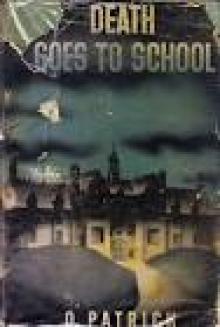 Death Goes to School
Death Goes to School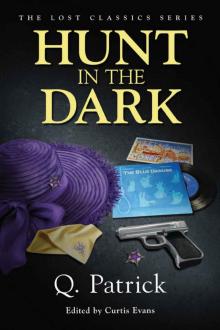 Hunt in the Dark
Hunt in the Dark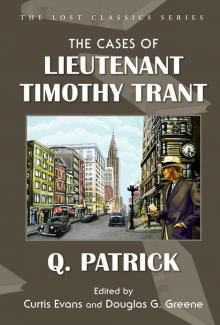 The Cases of Lieutenant Timothy Trant (Lost Classics)
The Cases of Lieutenant Timothy Trant (Lost Classics)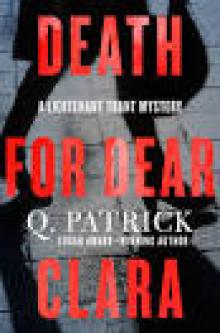 Death for Dear Clara
Death for Dear Clara S.S. Murder
S.S. Murder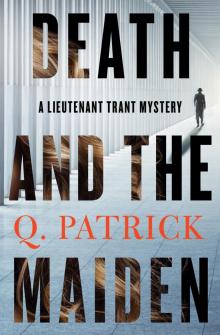 Death and the Maiden
Death and the Maiden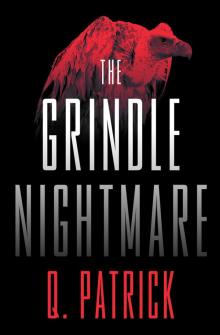 The Grindle Nightmare
The Grindle Nightmare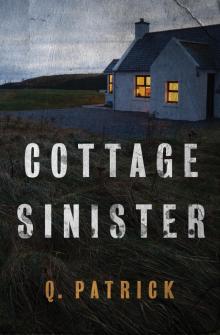 Cottage Sinister
Cottage Sinister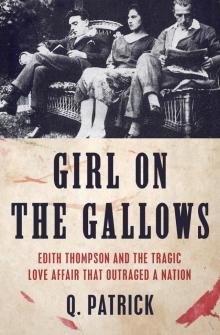 The Girl on the Gallows
The Girl on the Gallows